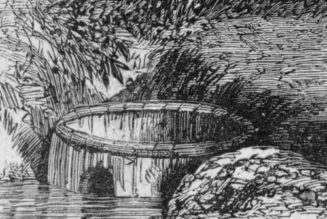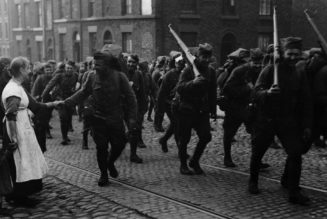Whether in the lower, middle, or upper school, we all associate the cooler, shorter days with the return of many good things. Fall feels scholastic as the leaves begin to litter the campus and the boys toss footballs on the field. In the classroom, we return to memorizing poetry for the Bard Competition at the Festival Days. We memorize poetry for all kinds of great reasons, which we’ve defended in the past. This article seeks rather to celebrate and share the great poems of Fall that we’ve committed to memory and performed.
I asked our entire Faculty to share the autumnal poems they love, focusing particularly on those poems they have either memorized themselves or that they encourage the boys to memorize. In the list below, I’ll add a few thoughts the faculty passed along or that I noticed as I read them myself. While these submissions came in from teachers across our Lower, Middle, and Upper Schools, most of these poems can be taught and reviewed at any age.
Some are familiar, I’m sure, but fall is the season for remembering. Hopefully, some are new and you notice them for the first time, and come back to them in future falls when seeking wisdom in this season.
Shakespeare’s Autumn Poems
You may have lines of this still lingering in your head from high school. Its opening lines offer the image of “yellow leaves, or none, or few” and we are presented with the autumnal reminder of death. While the poem continues with images of sunsets and death-beds, it ends with the beauty of lifelong love and explains why this poem and its poet deserve a place not only at the top of this list, but always on the tips of our tongues.
St. Crispin’s Day Speech (Henry V, Act IV, scene iii, lines 13-67) (October 25th)
Another inspiring one from the Bard which shows us the power of belonging. The poem also gives us memorable lines like, “We few, we happy few, we band of brothers” that we use to fire up little guys to fight Goliath or memorialize the Greatest Generation. This speech is wonderful for young men to memorize because it forces their idealism to choose. It helps them see that one day they will have to look back and wonder what battles they fought, for what prizes they carried the banner, and for what noble purposes they put everything on the line.
Keats’ Autumn Poems
This poem tops the list not just because it’s been so famous since it was first written, but because it focuses on all lovely things without bringing up their imminent death. Its celebration of autumn attempts to put even Spring (personified, and thus capitalized) in its proper place, advising Autumn “think not of the songs of Spring, thou hast thy music too.”
A long and winding poem, this one leads us not to reflect directly on fall, but death, forgetfulness, and loneliness. Full of Classical and Biblical allusions, the poem can fruitfully be studied for weeks. Perhaps those intrepid enough to try to understand it should memorize it. “Forlorn!” it cries in the last stanza, seeing in the Nightingale something that had brought the speaker out of himself, reflecting on the varying conditions of man.
Gerard Manley Hopkins Fall Poems
This poem overflows with joy, helping us “lift up heart, eyes” to notice “silk-sack clouds” and connect not only with Nature but its Author.
While not strictly a fall poem, the earlier sunsets make us think of lanterns. Hopkins focuses our attention on light and darkness, helping us think more concretely about life and death, knowing and forgetting. The closing image of Christ the “fírst, fást, last fríend” assures us that someone transcends the boundaries of our human limits for “ransom” and “rescue.”
Some identify this poem by its opening line: “Márgarét áre you gríeving.” While the reflection on death brought about by “Goldengrove unleaving” he follows it up with a nod to the first, and greatest poet, Homer, who compares (Book 6, lines146ff.) the generations of mortals to the leaves on the trees (a theme repeated in Sonnet 73 as well). Yet, the speaker addresses a young girl whose name translates either as pearl or daisy. The first understanding takes a long time to create, and the second lasts only slightly longer than a newspaper.
Robert Frost Fall Poems
With five entries, Frost clearly is a Faculty favorite. This poem focuses on the feeling of loss that Fall engenders. Not just the loss which will be renewed, the permanent loss of “a house that is no more a house / Upon a farm that is no more a farm / in a town that is no more a town.” The poet even examines the remains of the children’s playhouse, weeping for “what little things could make them glad.” Unlike Hopkins’s Spring and Fall, this poem doesn’t ask why we grieve but commands us to weep. The cellar of the house disappears under the earth “like a dent in dough” and we realize how fleeting even the physical signs of our existence are. And yet, for all Frost’s melancholy, the poem ends with an image of the Holy Grail—taken from the children’s playthings but now somehow made holy by being separated out—from which we can “drink and be whole beyond confusion.” Time’s destructive hand points beyond itself to the Eternal. Haunting and beautiful, well worth memorizing.
This poem focuses on the latter half of Fall, the part that leans, like the ladder in the opening lines, toward hibernation—whose etymology comes from the Latin word for an army’s winter-quarters. But this ladder points to heaven at the beginning and then examines all the ways the poet’s work and ladder fall so short of that lofty goal. Instead, he wants only rest in the end, even if it is only hibernation, the rest of the woodchuck. But the closing line, “Or just some human sleep” makes us wonder if even hibernation won’t answer to our exhaustion, finding the ladder always incomplete.
While this poem remains a favorite of American students everywhere, I often ask students who know it well whether or not the poem is presented ironically. That is, do we believe the poet accurately presents so much of his life as stemming from one set of decisions. Perhaps, but it could also be a commentary on how we look back at our own lives and have the tendency to assert too easily and pridefully, that the one decision that set us apart from others has “made all the difference.”
We read this poem at a faculty gathering recently, enjoying its celebration of “hushed October morning” on a beautiful afternoon outdoors. In addressing October, the speaker asks for time to slow down, not just for enjoyment, but to “enchant” or “beguile” us. The beautiful days flee too fast and this poem captures what it can in its metrical “amethyst”.
Never Again Would Bird Songs be the Same
This poem is the only one not directly related to the season. It is, nonetheless, a sonnet that pairs well with Kavanagh’s “October” below and explores themes of creation rather than decay and death. It balances out all this death with a rumination on life and the completion brought to Nature by the creation of Eve, the mother of all the living, who has an “eloquence so soft”.
Patrick Kavanagh Fall Poems
This Irish poet probably wouldn’t have received his own category if we’d not had a recent faculty gathering where we read three of his poems. I recommend two of them here for memorization.
This sonnet unfolds itself as the reflections of a nineteen-year-old man walking from town to country. I liked that it explored what was passing and what was constant at the same time.
In the old men around him, the speaker notices his own father.
Poets Earning One Poem Each for Fall
Autumn by Emily Dickinson
This jaunty poem captures so much of the excitement of fall in the things we notice: mornings grow “meeker” and the rose “is out of town.” It ends in celebration, though, since Nature’s best colors encourage the speaker of the poem to dress up in a celebration of the season. This poem is the shortest on the list, so it could be a good place to start for more timid memorizers.
Day in Autumn by Rainer Maria Rilke
This poem focuses on the richness of the harvest, but the perspective is one of prayer as the Lord is addressed in the first line. In that framework, the poem evokes thoughts of the fullness of time and the fruits of salvation all as part of the meditative backdrop of the work that must still be done.
Autumn by Henry Wadsworth Longfellow
Acknowledges death in autumn which other poets explore, this poem pursues instead the glory in the death. It opens by giving Spring its due glory, but also wants us to see Nature “from a beaker full of richest dyes, / Pouring new glory on the autumn woods.” As we’d expect from Longfellow, who often finds glory in the job well done, the last stanza turns to the human perspective and reminds us that the autumn sky should look upon our “duties well performed, and days well spent.” Only then can death be met with peace.
September 1815 by William Wordsworth
This sonnet examines the aspects of the other seasons’ presence in autumn. “This rustling dry…announce a season potent to renew.” The reflections on autumn are not always death, since we can also think of life in the midst of them. As I researched for this article, it seems that Wordsworth wrote a great many poems in September, proving just how potent the month can be for poetic rumination.
Lines Composed in a Wood on a Windy Day by Anne Brontë
The anapestic meter gallops through this poem—making another fun one to hear from small voices. Its focus on the physical feelings of Fall also makes it accessible and fun. The final stanza has the speaker wishing to see not only the leaves and the trees but the thrashing ocean waves. Who doesn’t want to watch Nature whip itself up into a frenzy?
The Geese by Richard Peck
The speaker remembers his father noticing the geese first. The geese ushered in winter “recalling the lure of far-off things.” This short poem rewards memorization for the connection between physical and psychical detail.
Immortal Autumn by Archibald MacLeish
This poem feels funereal, in spite of the title. The first line puns on “grave” and already has you thinking of death. He calls fall “the human season,” in part because it gives us “room to live now” and in part because it allows us to hear “a dead man’s cry from autumn long since.” Connecting now to the past almost makes it immortal.
That completes our incomplete look at the glories of autumn enshrined in verse. Tell us which of these is your favorite or share a new favorite in the comments below!
Join Our Telegram Group : Salvation & Prosperity








